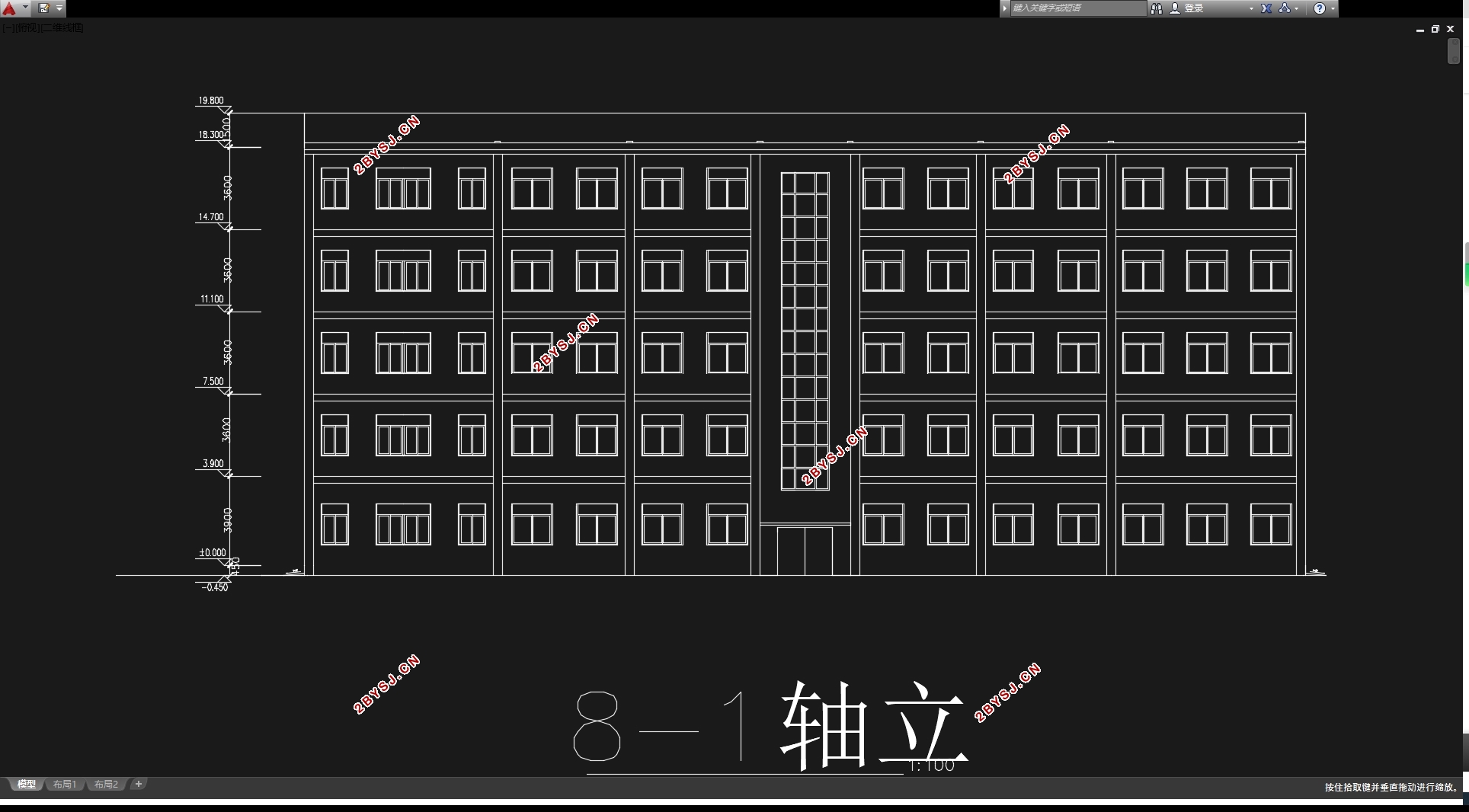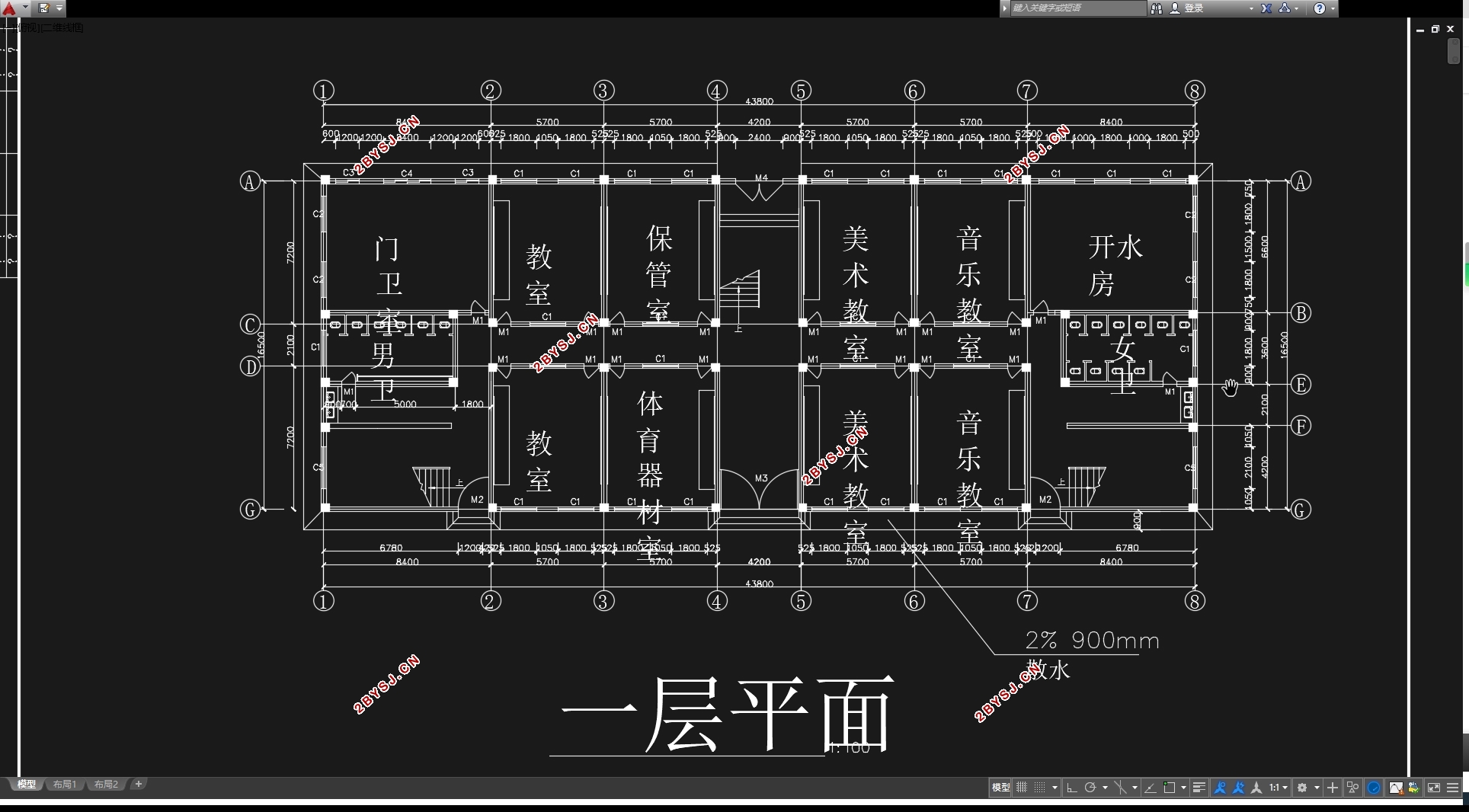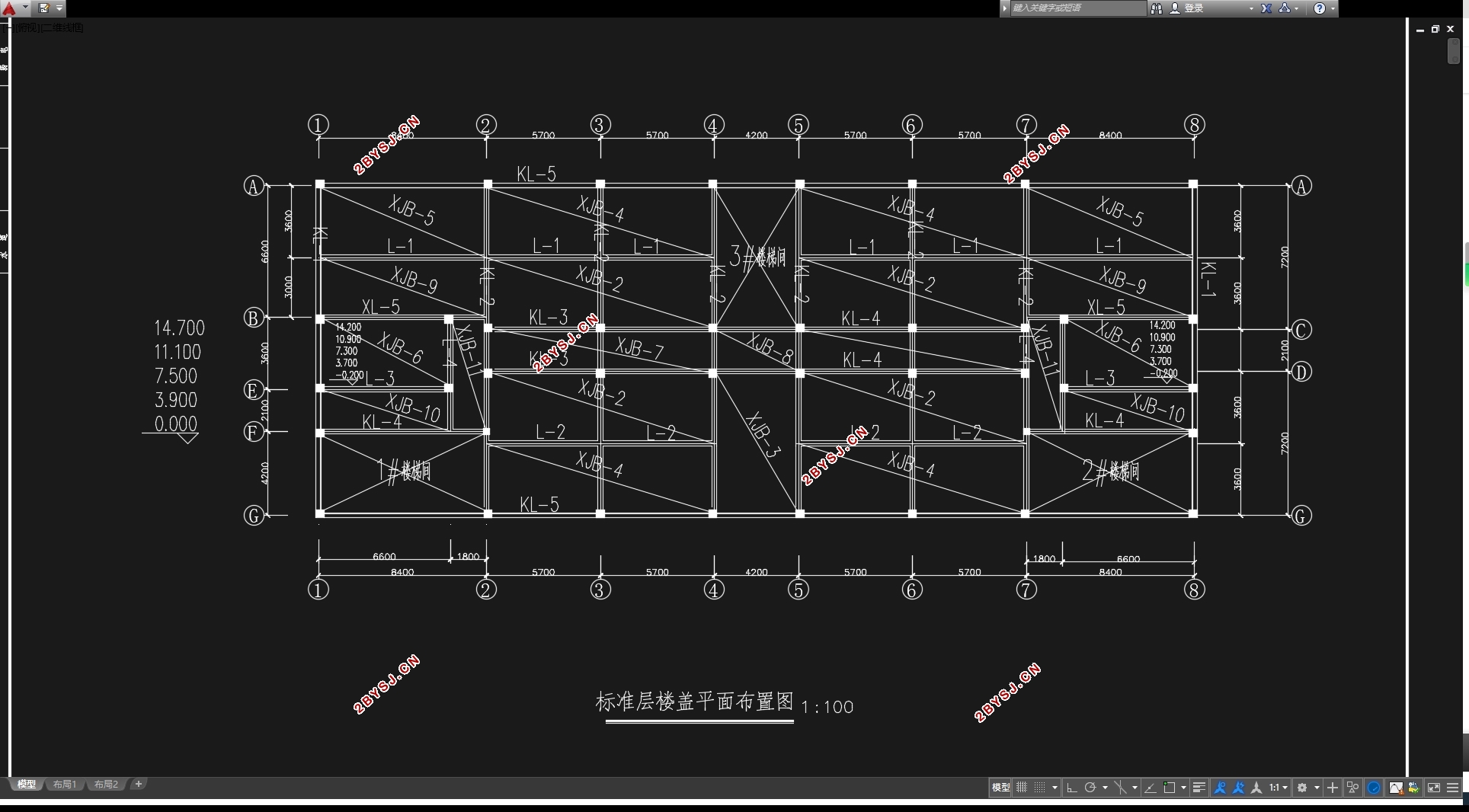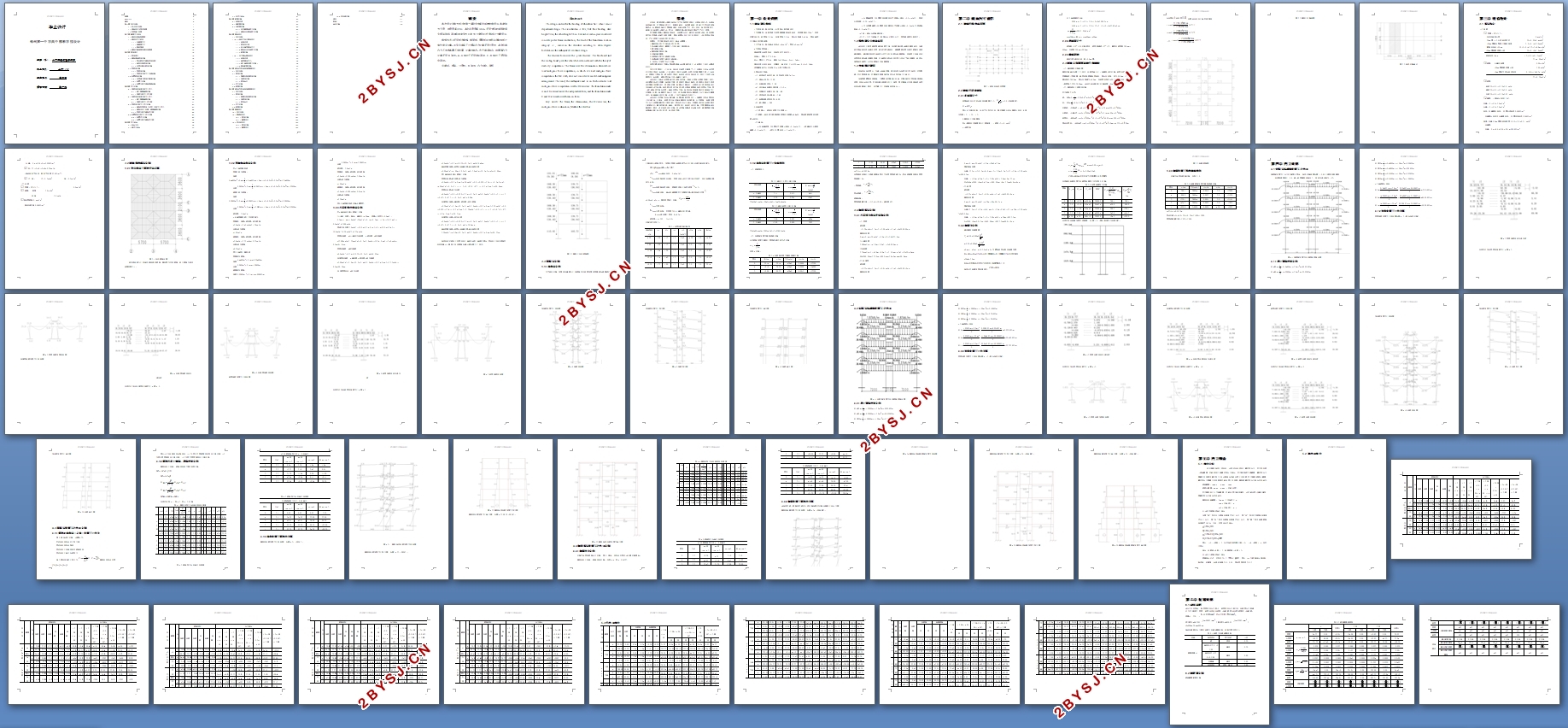五层郑州某中学高中部教学楼设计(含建筑图结构图)
无需注册登录,支付后按照提示操作即可获取该资料.
五层郑州某中学高中部教学楼设计(含建筑图结构图)(任务书,开题报告,外文翻译,计算说明书16000字,CAD建筑图10张,CAD结构图15张)
摘要
本次设计内容为郑州市某高级中学高中部教学楼设计。本建筑为五层,底层层高3.9m,其余各层层高3.6m。采用全现浇钢筋混凝土框架结构,基础场地类别为Ⅱ类,按七度设防进行结构之抗震设计。
楼梯形式上采用板式楼梯。楼面板、屋面板均按照双向整体板之弹性理论计算。在竖向载荷下之框架内力计算采用分层法,其中活载内力不考虑其最不利布置,计算时满布。水平载荷如风、地震等内力计算采用 D 值法。A、G轴柱下采用独立基础,C、D 轴柱下采用联合基础。
关键词:框架、分层法、D 值法、内力组合、配筋
Abstract
This design content for the building of Zhenzhou No.1 school senior department design. This construction is five, first floor building store height 3.9m, the others height 3.6m. Uses entire cast-in-place reinforced concrete portal frame construction, The kind of the foundation location category is , carries on the structure according to seven degrees fortifications the earthquake Ⅱ resistance design.
The staircase form uses the plate staircase. The floorboard and the roofing board press the whole bidirectional board with the theory of elasticity computation. The frame uses the delamination when vertical load endogenic force computation, in which live load endogenic force computation the full cloth, does not consider its most disadvantageous arrangement. The wind, the earthquake and so on the horizontal load endogenic force computation use the D value law. The foundation under A and G columella uses the independent form, and the foundation under C and D columella uses the union form.
Key words: The frame, the delamination, the D value law, the endogenic force combination, Matches the steel bar
1.1初步设计资料
1.工程名称:郑州市某中学高中教学楼设计
2.工程概况:该教学楼为五层钢筋框架结构体系,建筑面积约700m²,建筑平面为矩形。底层高3.9米,标准层高3.6米,室内外高差0.45米,其他轴网尺寸等详见平面简图。
3.天气条件:郑州基本风压=0.45kN/m2 ;雪压=0.4kN/m2
4.工程地质资料:
场地范围内地质构成,自地表向下依次为:
杂填土:厚度0.3~0.5米;
粘土:厚度5.5~8米,褐色fk=280kpa;Es=11.2MPa;
强风化至中风化砂岩,未揭穿,暗红色,fk>320kpa,Es>10.2MPa。
实测最高地下水位标高29m,水质无侵蚀性。






目录
摘要 4
Abstract 5
绪论 6
第一章 设计资料 7
1.1初步设计资料 7
1.2结构设计方案及布置 8
1.3变形缝之设置 8
第二章 截面尺寸初估 9
2.1 梁板柱结构布置图 9
2.2梁板柱尺寸初估 9
2.2.1.柱截面尺寸 9
2.2.2.梁截面尺寸 10
2.2.3.楼板厚度 10
2.3框架计算简图及梁柱线刚度 10
第三章 载荷统计 14
3.1 载荷统计 14
3.2框架结构载荷计算 16
3.2.1竖向载荷下框架受荷总图 16
3.2.2等效均布载荷计算 17
3.2.3各层柱集中载荷计算 18
3.3风载荷计算 21
3.3.1风载荷计算 21
3.3.2风载荷作用下之位移验算 22
3.4地震载荷计算 23
3.4.1各层重力载荷代表值计算 23
3.4.2地震力计算 24
3.4.3地震作用下结构侧移验算 26
第四章 内力计算 28
4.1恒载荷标准值作用下之内力 28
4.1.1梁之固端弯矩计算 29
4.1.2恒载作用下之内力图 29
4.2活载荷标准值作用下之内力 36
4.2.1梁之固端弯矩计算 36
4.2.2恒载作用下之内力图 37
4.3风载荷作用下之内力计算 43
4.3.1 框架在风载荷(左风)作用下之内力 43
4.3.2框架各柱之杆端,梁端弯矩计算 44
4.3.3风载作用下框架内力图 46
4.4地震载荷作用下之内力计算 48
4.4.1地震内力计算 48
4.4.2地震作用下框架内力图 50
第五章 内力组合 54
5.1 组合方法 54
5.2 梁内力组合 55
5.3柱内力组合 61
第六章 配筋计算 65
6.1材料选择 65
6.2梁配筋计算 65
6.3柱配筋计算 68
6.3.1柱正截面承载力计算 68
6.3.2 框架柱抗剪承载力计算 77
第七章 基础设计 79
7.1 设计资料 79
7.2 A、G轴柱下独立基础设计 79
7.2.1材料选择 79
7.2.2载荷设计值 79
7.2.3初步确定基础尺寸 80
7.2.4基础抗冲切承载力计算 81
7.2.5 配筋计算 82
7.3 B,C 柱下联合基础设计 83
7.3.1 材料选择 83
7.3.2 确定基础尺寸: 84
7.3.3 梁之弯矩与剪力计算 : 84
7.3.4 基础配筋计算: 85
第八章 整体式双向板肋梁屋盖设计 87
8.1 设计资料 87
8.2 载荷计算 87
8.2.1 屋面均布恒载荷计算: 87
8.2.2 活载荷计算 87
8.2.3 载荷合计 87
8.3 内力计算 88
8.4 配筋计算 94
第九章 整体式双向板肋梁楼盖设计 97
9.1 设计资料 97
9.2 载荷计算 97
9.2.1 楼面均布恒载荷计算: 97
9.2.2 活载荷计算 97
9.2.3 载荷合计 97
9.3 内力计算 98
9.4 配筋计算 105
第十章 楼梯设计 107
10.1 设计资料 107
10.2 楼梯板设计 107
10.2.1 载荷计算 107
10.2.2 截面设计 108
10.3 平台板设计 109
10.3.1 载荷计算 109
10.3.2 截面设计 109
10.4 平台梁计算 109
结论 112
致谢 113
参考文献 114
